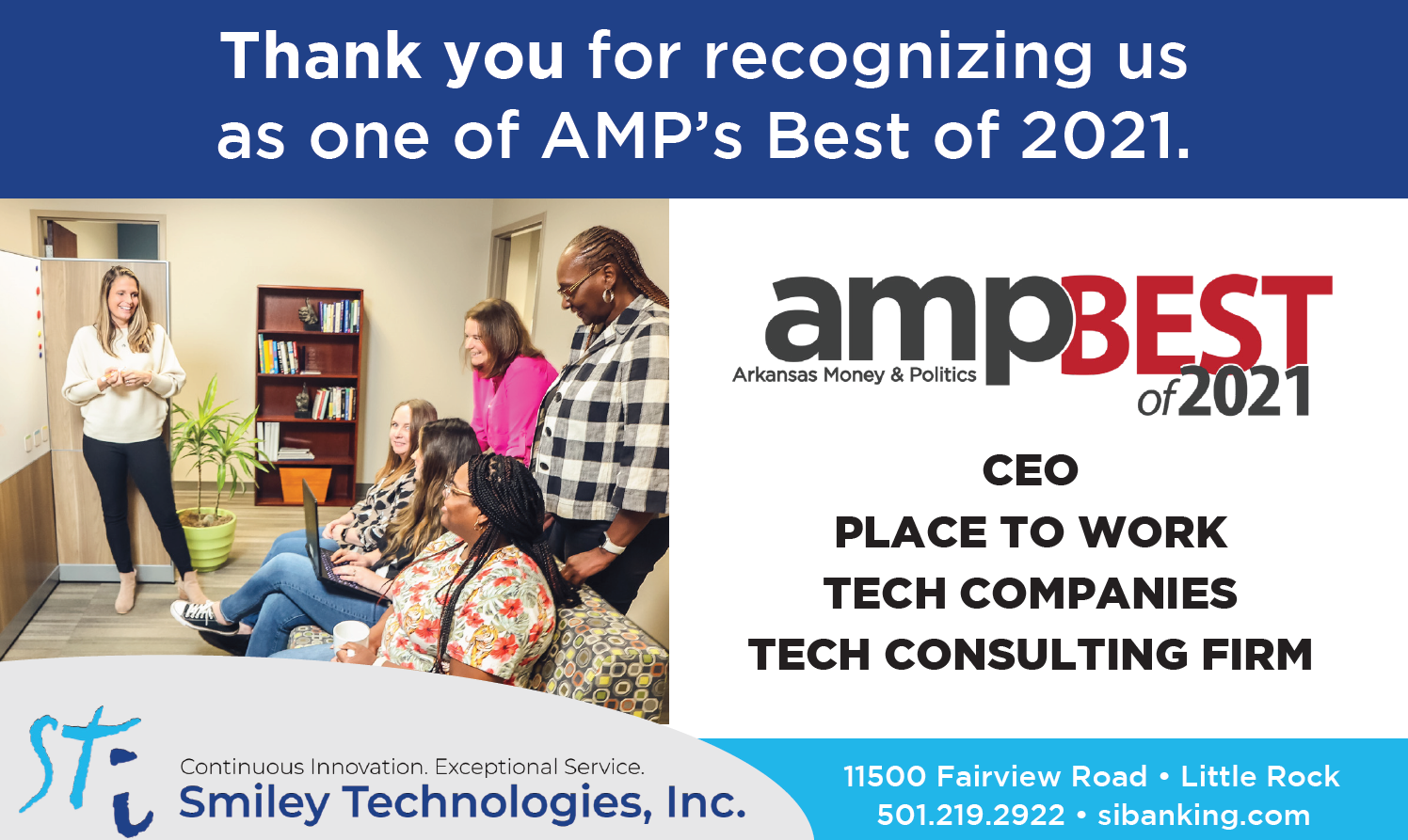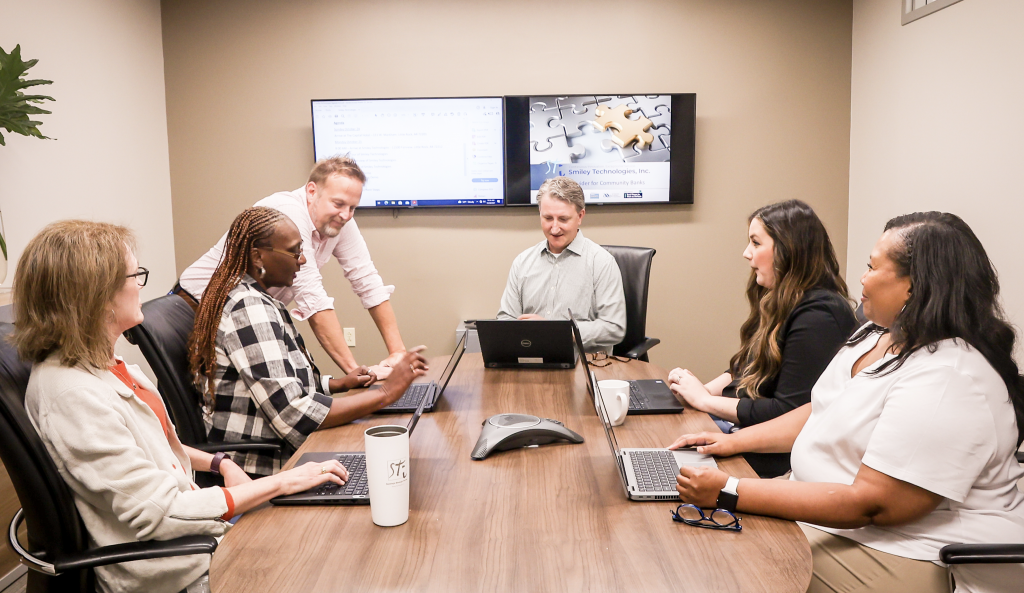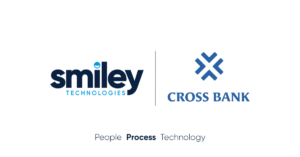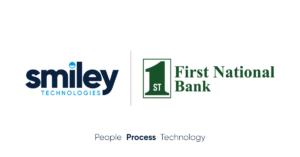In their November issue, Arkansas Money & Politics profiled our company and how we provide service to community banks. The article was part of their Best of 2021 issue which we were recognized for the four awards below:
- Best Places to Work
- CEO
- Tech Companies
- Tech Consulting Firm
Check out the article below. Thanks to Dwain Hebda for writing this piece and to everyone at Arkansas Money & Politics.
The banking landscape today is one of unparalleled access and control from your desktop to the palm of your hand. The industry is so technologically forward that it’s easy to forget just how recent all of these advancements are; just 20 years ago, the ability to move money from a smartphone or deposit a check with a camera click was still very much the stuff of science fiction.
As times and consumer demands changed, banks ramped up their offerings exponentially, often creating a back-office mess as they did so. The result, in the words of Elizabeth Smiley Glasbrenner, president and chief executive officer of Smiley Technologies, is “software spaghetti” — a tangled maelstrom of cobbled-together systems and providers. And that has provided ample opportunity for the banking software company based in Little Rock.
“The early core systems were just ledger systems; they were the ability to keep track of accounts in the general ledger, from which you might have had to produce bank statements and reports,” Glassbrenner said. “There’s a lot of logic there, but that’s all banking technology was back in the ‘60s and ‘70s. And what’s happened is you now have things like debit cards, ATMs, mobile banking, document imaging, check imaging, telephone banking, all the things that are now pieces of banking. All of the other legacy systems either buy a company or they interface with them, but the back piece is still the same.
“Ours is a little different. We took the approach of saying there are some things that are now inherent to banking. Check images now are inherent to banking; you can’t be a bank processor and not do electronic check images anymore. So, let’s build that as part of it together, the document imaging, the online banking piece and mobile banking. Those are all inherent pieces of our software that we built.”
The approach has been particularly appealing to small community banks, which are the bread-and-butter of Smiley Technologies’ clientele. Such institutions need a reliable, feature-rich software package to remain competitive, but generally don’t have the IT budget or the dedicated personnel that the big boys do. Smiley’s products give Main Street institutions the best of all worlds, including a staff that shares a kindred business philosophy.
“If I’m honest, I think [small banks] are just people more like us,” Glasbrenner said. “Some of those banks really get lost between the large vendors and the large markets. If we can help keep the community banks alive in some of these communities then we’re doing our part. For us, that’s more fun. I feel like we can make a real impact.”
Glasbrenner and Co.’s role as the plucky little underdog is locally ironic, considering one of the behemoths they compete against is Little Rock-based Systematics, a company built from scratch by Glasbrenner’s father Walter Smiley, whose work would virtually coin the term “fintech.” Smiley, who once was listed by Business Week as one of the “People Who Run America’s 1,000 Most Powerful Companies,” sold the company to ALLTEL in 1990, which in turn sold it to FIS in 2003.
Smiley Technologies, founded in 2002 by Glasbrenner and her brother Vance Smiley, does not and never has endeavored to be the second coming of Systematics, content instead to leverage underserved niches in the banking market. In fact, the original concept for the company was not to write their own software at all, but to be an outsource manager of banks’ systems.
“When we were born in 2002, it was really out of the need from a bank that had a service problem with their vendor,” Glasbrenner said. “We thought maybe if we just became a service business, then we’ll manage your software for you and interface with the company, and we’ll alleviate probably 90 percent of your problems. And they said, ‘Sure, we’ll be your first customer, if your father watches you and makes sure you don’t screw it up.’
“We headed down this road to be this service business and about a year into it, we realized you really can’t provide great service and help them out if you don’t have control of the software. So, we embarked on a path, probably naively, to build a new core system.”
Growing up in their father’s entrepreneurial shadow not only honed the siblings’ business chops but gave them a keen understanding of how important personal relationships are in establishing trust. This is particularly vital when talking about switching from one core system to another.
“Banks are inherently scared to change out their core system. You’re essentially ripping the guts out and shoving them back in with a new software. That’s hard on the bank,” Glasbrenner said.
“When I was a kid, we used to go to the data centers, and we’d go to the banks with my dad and really saw the partnerships, the true friendships he had with those people and the ability to help them when they needed to change their strategy or do something different. Our whole goal really has been to resurrect that concept.”
Partners Bank in Helena recently underwent the process of changing its systems over to Smiley Technologies. President and CEO John Moore said the nerve-wracking process came off without a hitch, thanks to the software firm’s expertise and process.
“Switching our core banking system and IT managed services to Smiley Technologies will allow us to grow the bank to levels no one ever thought possible,” Moore said. “Their partnership model, along with their innovative products and exceptional service, made our decision to switch to Smiley Technologies easy.
“Smiley Technologies offers a true partnership model with genuine care for their customers that is unseen in this industry. The Smiley team goes above and beyond for their customers, which was evident the past few months during the conversion process.”
Billing oneself as the high-touch alternative in a high-tech marketplace puts a particular priority on the quality and scope of the company’s workforce. Meeting that expectation takes constant refinement, smart hires and since early 2020, fresh thinking when it comes to attracting and retaining talent.
“If you’d had told me two years ago we’d have some remote workers that don’t even live in-state, I would have told you, you were crazy,” Glasbrenner said. “[COVID] has definitely opened up my eyes. I’ve got to give the staff credit for that because they proved they can do it remotely and at home.
“I don’t love it because I want people to be together, that’s just my nature. But I think it’s a fact of what we have to deal with. We are getting great talent that we might not have had exposure to before. The job market’s hard right now, especially because we’re in a growing state and trying to find people right now is pretty tough.”
Another effective lure for employees is the company’s community-focused culture. Often bandied about as a catchy slogan, Smiley Technologies’ commitment to higher purpose in its work is authentic, from the clients it focuses on to philanthropic activities steeped in Glasbrenner’s former career in nonprofits. All of which add up to a congenial, close-knit working environment that’s in step with what many workers are looking for.
“I always had this affinity for helping people, trying to do things for other people,” Glasbrenner said. “That was really what drove me and what excites me about what I do. It never occurred to me that I could do that in the corporate world; I thought I had to be in a nonprofit to do that.
“But when I took over as CEO at Smiley, I realized that is my job. My job is to help all these people be successful including our customers. I get way more fulfillment out of this than I ever thought that I would, being able to create an environment where I can help employees and their families, plus all of our customers, on a daily basis. That’s very, very fulfilling for me, and creating opportunities for community involvement and all that, that’s just kind of icing on the cake.”
As the company enters its second decade, it’s grown to 62 employees with clients scattered all over the country including Dallas, San Antonio and Charlotte among others. As proof of concepts go, Smiley Technologies has built a pretty compelling case, excelling in big city and small-town institutions alike. This has given company leadership the opportunity to pick and choose clients that provide the best cultural and philosophical match.
“I think we’re to a place where we can compete anywhere,” Glasbrenner said. “There are big communities that are using our software and doing very well. I don’t have any heartburn over that; I’m just not sure that’s our long-term strategy. We really want to focus on those smaller town banks where we can really make a difference so that they don’t go away, frankly. I think community banks are a really important part of our future.
“We have that luxury of being able to really go after our purpose in why we want to do this and not have to just focus on the money part of it. We’re not trying to be at a thousand banks like our competitors. We will lose what we’re good at if we go try to do that. At 50 to 80 banks we think, given the history we’ve seen, the service model breaks and you don’t want to do that. Service is the fun part about this for us.






